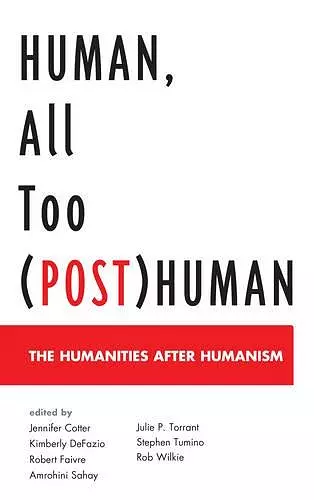Human, All Too (Post)Human
The Humanities after Humanism
Jennifer Cotter editor Kimberly DeFazio editor Robert Faivre editor Amrohini Sahay editor Julie P Torrant editor Stephen Tumino editor Robert Wilkie editor
Format:Hardback
Publisher:Lexington Books
Published:2nd Jun '16
Currently unavailable, and unfortunately no date known when it will be back

The contemporary has marked itself off from modernity by questioning its humanism that centers the world around the human as the moral subject of free will and self-determination, the bearer of universal essence that is the basis of human rights. Modernism normalizes humanism through language as referential, a set of interrelated signs that correspond to the empirical reality outside it. Humanist modernity, in other words, is seen in the contemporary as a regime that, by separating the human from the non-human and insisting on language as correspondence, not only fails to engage the emerging forms of social relations in which the boundaries of human and machine are fading but is also indifferent to the difference between the “other”’s life and other lives. Human, All Too (Post)Human: The Humanities after Humanism argues that the Nietzschean tendencies that provide the philosophical boundaries of post-humanism do not undo humanism but reform it, constructing a parallel discourse that saves humanism from itself. Grounded in materialist analysis of social life, Human, All Too (Post)Human argues that humanism and post-humanism are cultural discourses that normalize different stages of capitalism—analog and digital capitalism. They are different orders of property relations. The question, the writers argue, is not humanism or post-humanism, namely cultural representations, but the material relations of production that are centered on wage labor. Language, free will, or human rights are not the issues since “Right can never be higher than the economic structure of society and its cultural development conditioned thereby.” The question that shapes all questions, in Human, All Too (Post)Human is freedom from (wage) labor.
Human, All Too (Post)Human is the culmination of some extraordinary and necessary work produced over the last 20 years. . . . The authors argue convincingly that the recent theory emerging from neoliberalism obscures history, materiality, and class relations. * Science & Society *
Human, All Too (Post)Human is an uncommon book; it is a philosophically insightful and erudite analysis of the contemporary situation with deep political commitment to social change. It is a piercing root critique of governing ideas and the social conditions that produce them at a time when critique itself has become the target of accommodationist thinkers such as Bruno Latour in order to sideline such un-assembling of the social. Written against the horizon of Marx’s Critique of the Gotha Program, Human, All Too (Post)Human, breaks the silence on what has become unspeakable in contemporary cultural critique and argues not for freedom from humanism or post-humanism, which have haunted bourgeois thought, but for a future free from wage labor. -- Peter McLaren, Honorary Chair Professor and Director of the Center for Critical Studies, Northeast Normal University, China
ISBN: 9781498505734
Dimensions: 234mm x 160mm x 24mm
Weight: 535g
252 pages